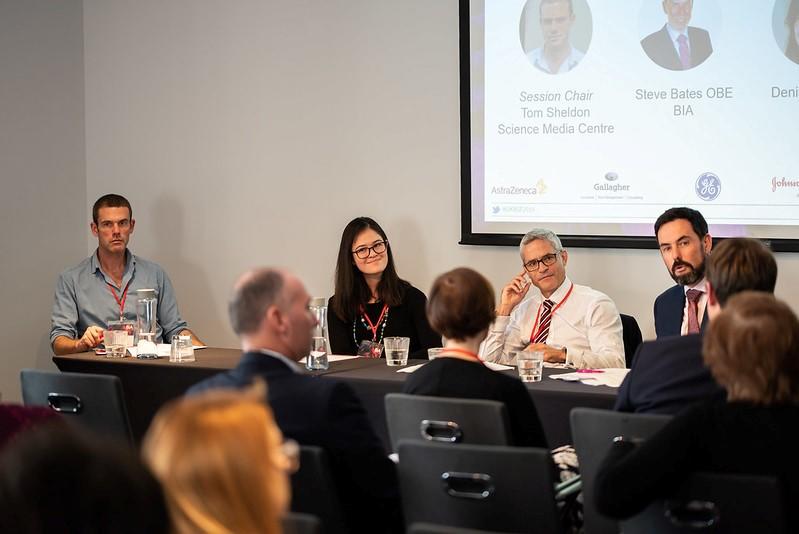Is biotech bad news?
Is biotech bad news? That was the question asked of an expert panel of media and communications experts at the recent UK Bioscience Forum.

Panel from left to right: Chair Tom Sheldon Science Media Centre, Denise Roland Pharmaceuticals reporter at the Wall Street Journal, Chris Gardner Partner Consilium Strategic Communications and Steve Bates OBE, CEO of the BIA.
Denise Roland started us off and explained that a journalist’s role is to scrutinise and judge stories on their own individual merits. As Denise explained this isn’t something that should be feared but welcomed, scrutiny doesn’t mean negative, it means a deeper analysis of the information and arguments presented which in turn tends to lead to a better story. Denise explained how stories where there is conflict or a difference of opinion, are the most popular as they allow for a fuller picture to be shown to the reader.
Chris Gardner made the pertinent point that ‘bad news sells newspapers’. In the highly competitive and pressurised environment that journalists operate in, editors are more likely to choose a story with controversy as that will lead to more eyeballs on the story and their publication. In an age where web and social media traffic are becoming ever more increasingly important, this point will only grow in the future.
Chris also explained the difficulties which are inherent in our sector’s communications, the subject matter which we deal in - complex science and research - is not easily translatable to the pages of a national publication. What we think as a sector is ‘news’, needs to be framed as such for journalists. The sector needs to develop stronger relationships with journalists to ensure that important milestones are embedded in journalists thinking and can be built upon.
Steve Bates offered a more structural analysis of why biotech and life sciences stories might be struggling to break through - there are far too few specialised pharmaceuticals/biotech/life sciences reporters now at national publications. The journalists covering our sector tend to be quite broad, with many business, general health and even Brexit reporters picking up our beat. What that means is that at some publications there is a lack of institutional knowledge of our sector and their knowledge of biotech tends to be more general, or worse, based solely around controversies rather than innovations.
Steve also said our sector’s positive media tends to have two set landmarks, ‘the discovery’ where a new treatment, drug or medical device is hailed as the latest breakthrough to treat X and ‘completion’, where ‘drug X has treated XX number of patients’. The problem for our sector is that the space between those two landmarks could be a couple of years or in some cases a couple of decades. How we bridge the gap between drug discovery and patient treatment, and the story we tell between that might lead to better coverage of the sector.
Questions then came from the audience, where a point was made about how companies’ press releases and media overtures are viewed less favourably than information from NGOs and universities. Tom Sheldon from the Science Media Centre said that in many newsrooms there is a view that, when companies issue information, they are doing so mainly to improve their profit margins. He said that journalists are more suspicious of industry than of most other sectors, e.g. NGOs, which are often held – unfairly - to lower standards. He added that, in his experience, companies are often much more factual and rigorous than they are given credit for, and the bioscience industry must continue to ensure the voices of its senior scientists are heard by journalists and the public.
This discussion could have lasted for hours and in all honesty, we scratched the surface with this debate. The panel didn’t have chance to explore the rise of social media and how ‘click bait’ is influencing newsrooms and the general public.
This is a debate the BIA welcomes and wishes to explore further. Soon we will be announcing dates for the relaunch of our Communications Forum, where this topic will be again debated. If you are interested in attending the Communications Forum please email Jack Fellows on [email protected] for further information.
I’d like to thank the panel for giving up their time and sharing their thoughts with delegates, plus a big thanks in particular to our media partners Consilium Strategic Communications and the support they provided in getting the panel together.
.png)
.png)
